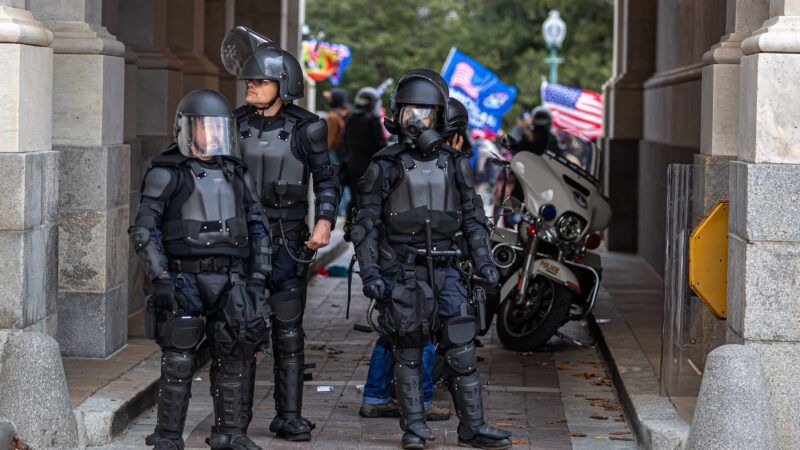If You Care About Police Accountability on January 6, You Should Care About It Every Day
Supporting the cause because your "side" went down is not a principled position.

Fox News host Tucker Carlson has been a major player in the prime-time charge against police accountability since last summer, after the death of George Floyd thrust the subject into the limelight.
In recent months, however, it appears he's had a change of heart. "So she's an unarmed protester. I don't think we execute unarmed protesters, do we?" he asked wryly on his show last night, referring to Ashli Babbitt, the woman shot and killed by Lt. Michael Byrd after she stormed the U.S. Capitol building on January 6. "Well, we just did."
It's a strange turn for Carlson. For months, he has called for Byrd's identity to be unmasked and for him to be held accountable. He partially got his wish last evening when the officer sat down for an interview with Lester Holt of NBC News.
Carlson is not alone. He's joined by Rep. Paul Gosar (R–Ariz.), for example, who is also selectively beating this drum. "Why have no charges been brought against the shooter for negligent homicide or more?" he asked in a public statement released in July.
It appears that this newfound dedication to police accountability championed by a select group of conservative pundits and politicians applies solely to the events of January 6. Which is to say that they do not actually support police accountability in any meaningful way.
Over a year ago, I wrote about Carlson's diatribe against reforming qualified immunity, the legal doctrine that insulates government officials from lawsuits for misconduct. Following Floyd's death, Congress expressed an interest in reining in the doctrine; Carlson expressed, well, the opposite, having much to say about it, almost all of it inaccurate. That didn't stop him from publicly flogging Sen. Mike Braun (R–Ind.) for introducing the only Republican bill in the Senate to curtail qualified immunity, which the senator subsequently threw away.
Floyd's fate did not receive much sympathy from Carlson et. al. Both Floyd and Babbitt were unarmed. The former furnished a counterfeit $20 bill, the latter stormed the Capitol. But Babbitt's demise has Carlson and others calling for action—declarations that are intensifying following Byrd's interview, in which he claimed that he "saved countless lives" through what he did that day.
That's a dubious claim, and one that would likely be met with much derision from the mainstream media had another officer made the comments in the context of just about any other officer-involved shooting. Most topics in the U.S. receive media coverage polarized along partisan lines, although police and police abuse tend to push that trend to the limit. To many on the left, it seems the police are always the villains; to the right, they are almost always heroes—until January 6, when everyone switched places.
But there is nuance to be had in substantive policy debates that seek to give victims recourse. Supporting those policy changes on one singular day because "your side" went down is not a principled position.
The concept should be familiar to Carlson and other conservative Republicans, a group that used to understand that any legislative decisions must be carefully considered, lest they be weaponized by the other side. It is also the party that, at one point at least, believed in limited government, and the notion that you should be able to hold rogue state actors accountable when they trample on your rights. In other words, Carlson's new support for police accountability is a sensible place to arrive—if only he'd apply it evenly.


Show Comments (456)